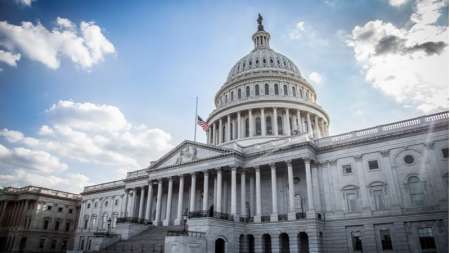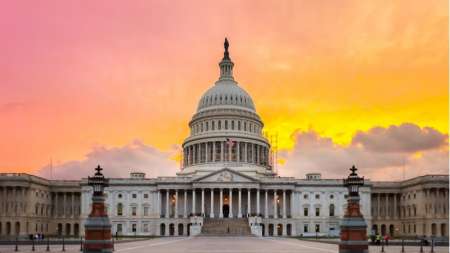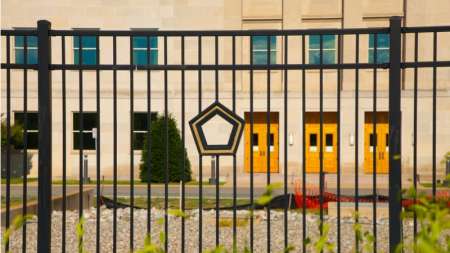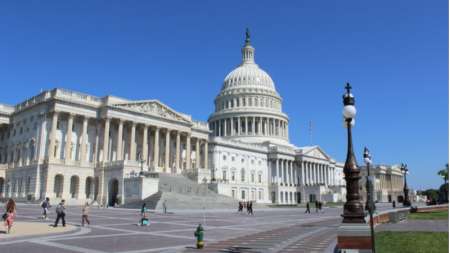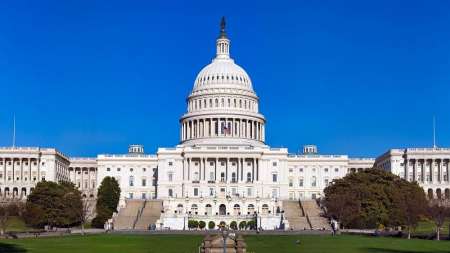Defense Secretary Lloyd Austin and Commerce Secretary Gina Raimondo pleaded with congressional leadership today for quick action to approve COMPETES Act legislation – also known as the Bipartisan Innovation Act – that has been hung up for several weeks in a House-Senate conference committee. […]
The House of Representatives passed the Quantum Computing Cybersecurity Preparedness Act by voice vote on July 12. […]
Rep. Haley Stevens, D-Mich. – joined by Reps. Dan Kildee, D-Mich., Mike Waltz, R-Fl., and Anthony Gonzalez, R-Ohio – introduced legislation on June 29 to address the nation’s semiconductor shortage by attempting to grow the sector’s workforce. […]
Bipartisan legislation introduced in the Senate on June 23 aims to create new rules for bulk exports of U.S. citizens’ personal data that would help protect that data from use by hostile foreign governments. […]
The Senate Select Committee on Intelligence on June 22 unanimously approved the Intelligence Authorization Act (IAA) for fiscal year (FY) 2023 to authorize funding, provide legal authorities, and enhance congressional oversight for the U.S. intelligence community (IC). […]
The Office of Majority Leader of the House of Representatives Steny Hoyer, D-Md., is pushing for Congress to better prioritize digital technologies and keep pace with the evolving world. […]
The House Armed Services Committee voted on June 22 to approve the portion of the fiscal year 2023 National Defense Authorization Act (NDAA) authored by the committee’s Subcommittee on Cyber, Innovative Technologies, and Information Systems. […]
The House Appropriations Committee voted on June 22 to approve its fiscal year 2023 defense funding bill which totals $761 billion, up $32 billion – or about four percent – from the FY2022 level. […]
The Senate Armed Services Committee on June 16 completed its markup of the fiscal year 2023 National Defense Authorization Act (NDAA) and voted 23-3 to send the spending bill to the full Senate for consideration. […]
Rep. Darren Soto, D-Fla., along with Christy Goldsmith Romero, a newly appointed commissioner of the Commodity Futures Trading Commission (CFTC), today urged Congress to provide regulatory clarity on the growing cryptocurrency and blockchain industries. […]
New bipartisan legislation from Sens. Kirsten Gillibrand, D-N.Y., and Cynthia Lummis, R-Wy., aims to create a complete regulatory framework for digital assets such as cryptocurrencies, but the senators emphasized today how the bill also addresses the cyber aspect of digital assets. […]
In today’s edition of Countdown to MerITocracy, we’re taking a look at what may change for the better in the near-term U.S. outlook – how about having the government help recreate the U.S. semiconductor sector that mostly drifted overseas a generation ago – plus billions in Federal R&D funding that stands ready to be put to work in pending legislation in Congress. That money would flow through the National Science Foundation – whose director Dr. Sethuraman Panchanathan is a featured speaker at MerITocracy. […]
Congress is due to get a big influx of skilled technologists who will act as advisers to congressional offices courtesy of the TechCongress Congressional Innovation Fellowship. […]
The Senate late last week approved legislation that aims to increase the transparency of the Department of Veterans Affairs (VA) Electronic Health Records Modernization (EHRM) program through regular reporting requirements. The Senate’s vote sends the bill to President Biden’s desk for a final signature. […]
The Senate Homeland Security and Governmental Affairs Committee on May 25 voted to approve and send to the full Senate legislation that would tighten up oversight of Federal agency performance goals and publish more public data on the performance.gov website to help track how agencies are performing against those goals. […]
Sens. Mike Crapo, R-Idaho, and Mark Warner, D-Va., introduced legislation this week that would improve the collection and publication of data standards of eight Federal financial regulatory agencies. […]
The Senate Homeland Security and Governmental Affairs Committee advanced a bill May 25 that aims to address potential conflicts of interest within the Federal contracting community. An amended version of the bill was reported favorably out of committee and heads to the full Senate for possible consideration. […]
The Senate Commerce, Science, and Transportation Committee on May 25 approved a bill that would direct the White House Office of Science and Technology Policy (OSTP) to develop a national strategy for the research and development (R&D) of distributed ledger technologies. […]
A new bill introduced in the House by Rep. Peter Welch, D-Vt., would create a regulatory agency to govern some aspects of the “Big Tech” sector, and ensure algorithms on digital platforms are fair and safe. […]
The House Committee on Financial Services on May 17 voted to approve an amended version of H.R.7022 – the Strengthening Cybersecurity for the Financial Sector Act of 2022 – and send the bill to the full House of Representatives for consideration. […]
The House of Representatives Committee on Science, Space, and Technology voted today to favorably report the Energy Cybersecurity Leadership Act of 2022 (H.R. 7569) to the full House for consideration. […]
The House Committee on Oversight and Reform on May 11 voted to approve a bevy of bills that aim to help advance IT modernization and address government Federal workforce needs. […]
A group of 20 House members led by Reps. Doris Matsui, D-Calif., and Brett Guthrie, R-Ky., are urging the House Appropriations Committee to provide more funding for the Secure and Trusted Communications Networks Reimbursement Program (SCRP). […]
The House of Representatives voted on May 11 to approve H.R. 847 – the Promoting Digital Privacy Technologies Act, by a margin of 401-19. […]
Top U.S Army leaders told senators today they are confident in the service branch’s modernization funding priorities for the Fiscal Year 2023 Defense Authorization Request, while Republican committee members advocated for a further boost in Army funding. […]
The Senate Commerce, Science, and Transportation Committee today voted to approve the National Manufacturing Extension Partnership (MEP) Supply Chain Database Act of 2021, and the Network Equipment Transparency Act. […]
New legislation introduced by Senate Homeland Security and Governmental Affairs Committee Chairman Gary Peters, D-Mich., and Sen. Mike Braun, R-Ind., aims to tighten up oversight of Federal agency performance goals, and publish more public data to help track how agencies are performing against stated goals. […]
The Senate held a series of votes May 4 to instruct its 26 conferees on the direction the chamber wants them to take in negotiations on the USICA/COMPETES semiconductor, innovation, and competition legislation working its way through Congress. […]
Sen. Cynthia Lummis, R-Wyo., said during an Axios virtual event today that she is confident her bipartisan cryptocurrency legislation with Sen. Kirsten Gillibrand, D-N.Y., will allow members of Congress to find “common ground” and a better understanding of digital assets. […]
A bipartisan bill introduced in the House this week aims to increase oversight and regulatory clarity of the growing cryptocurrency market, and provide the Commodity Futures Trading Commission (CFTC) with oversight authority of the market. […]

